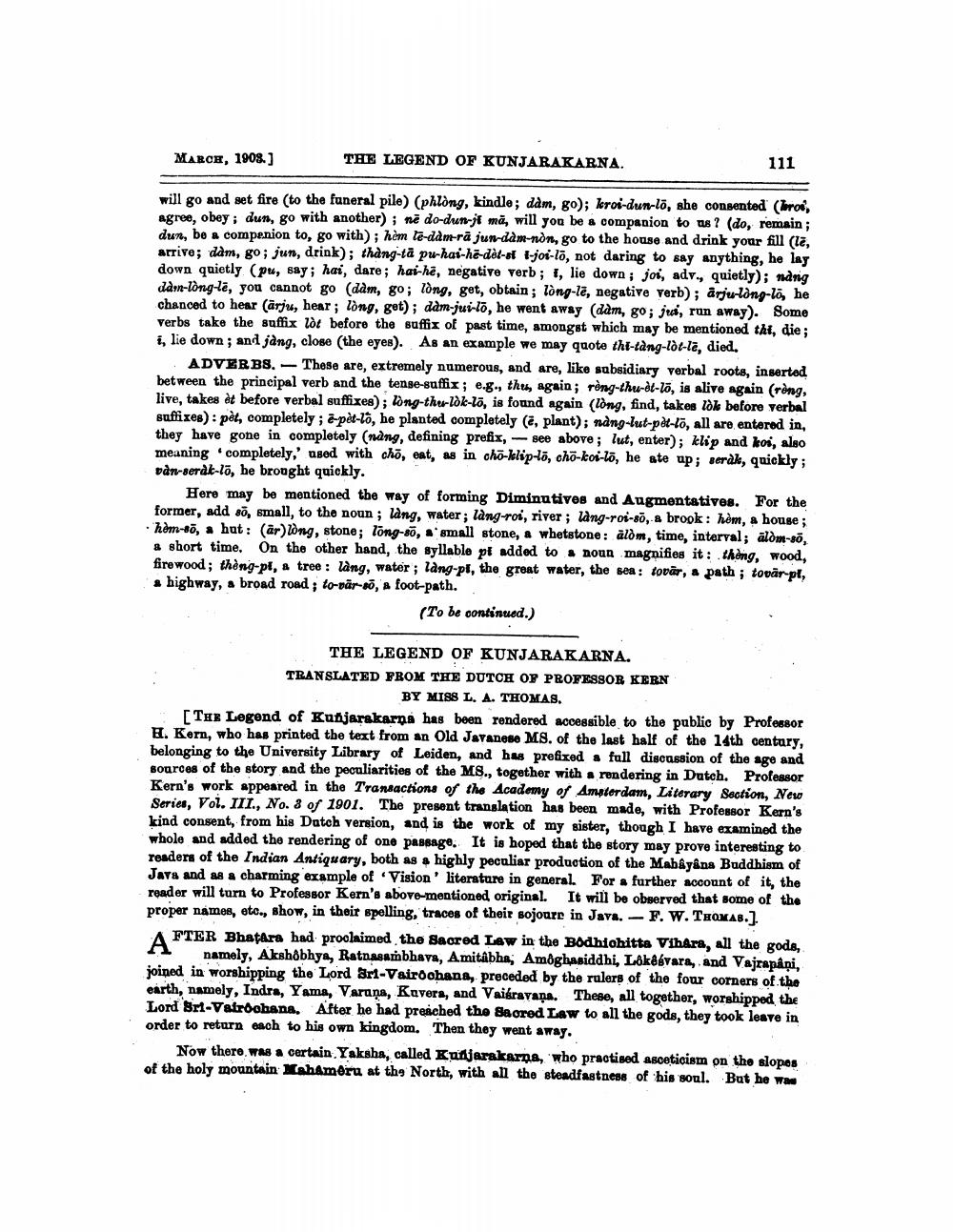________________
MARCE, 1908.]
THE LEGEND OF KUNJARAKARNA.
111
will go and set fire (to the funeral pile) (phlòng, kindle; dam, go); kroi-dun-lo, she consented' (uros, agree, obey; dun, go with another) ; në do-dun-ji mä, will you be a companion to us? (do, remain; dun, be a compenion to, go with); hèm te-dam-ra jun-dam-nòn, go to the house and drink your fill (la, arrive; dam, go; jun, drink); thang-tā pu-has-ho-det-sf l-jos-lo, not daring to say anything, he lay down quietly (pu, say; hai, dare; hai-hë, negative verb; 1, lie down; joi, adv., quietly); nang dam-long-te, you cannot go (dam, go; lòng, get, obtain; lòng-lē, negative verb); arju-long-lo, he chanced to hear (ärju, hear; lòng, get); dam-jui-lo, he went away (dam, go; js, run away). Some Verbs take the suffix ide before the suffix of past time, amongst which may be mentioned thi, die; i, lie down; and jàng, close (the eyes). As an example we may quote thi-tang-lot-la, died,
ADVERBS. These are, extremely numerous, and are, like subsidiary verbal roots, inserted between the principal verb and the tense-suffix; e.g., thu, again; ròng-thu-dl-lo, is alive again (ròng, live, takes èt before verbal suffixes); Tong-ther-lok-lā, is found again (lòng, find, takes lòk before verbal suffixes): pòt, completely ; pèt-lo, he planted completely (e, plant); nang-lut-pot-lo, all are entered in, they have gone in completely (nàng, defining prefix, - see above; lut, enter); klip and koi, also meaning completely,' used with cho, eat, as in cho-klip-lo, cho-koi-lo, he ate up; serdk, quickly; pan-serat-lo, he brought quickly.
Here may be mentioned the way of forming Diminutives and Augmentatives. For the former, add sā, small, to the noun ; lang, water; làng-roi, river; lang-roi-so, a brook: hèm, a house; hêm-, a hut: (ar) long, stone; Tong-so, a small stone, a whetstone: älòm, time, interval; alom-so, & short time. On the other hand, the syllable pt added to a noun magnifies it: thông, wood, firewood; thèng-pl, a tree : làng, water; lang-pt, the great water, the sea : tovar, a path ; tovar pl, 2 highway, a broad road ; to pār-60, a foot-path..
(To be continued.)
THE LEGEND OF KUNJARAKARNA. TRANSLATED FROM THE DUTCH OF PROFESSOR KERN
BY MISS L. A. THOMAS. [The Legend of Kunjarakarna has been rendered accessible to the public by Professor 8. Kern, who has printed the text from an Old Javanese MS. of the last half of the 14th century, belonging to the University Library of Leiden, and has prefixed a full discussion of the age and sources of the story and the peculiarities of the MS., together with a rendering in Dutch. Professor Kern's work appeared in the Transactions of the Academy of Amsterdam, Literary Section, New Series, Vol. III., No. 8 of 1901. The present translation has been made, with Professor Kern's kind consent, from his Datch version, and is the work of my sister, though I have examined the whole and added the rendering of one passage. It is hoped that the story may prove interesting to readers of the Indian Antiquary, both as a highly peculiar production of the Mabâyâna Buddhism of Java and as a charming example of Vision literature in general. For a further account of it, the reader will turn to Professor Kern's above-mentioned original. It will be observed that some of the proper names, etc., show, in their spelling, traces of their sojoure in Java.-F.W. THOMAB.) AFTER Bhatara bad proclaimed the sacred Law in the Bodhiohitta Vihara, all the gods,
namely, Akshobhys, Ratnasambhava, Amitabha, Amôghasiddhi, Lökébvara, and Vajrapani, joined in worshipping the Lord Brt-Vairdohans, preceded by the rulers of the four corners of the earth, namely, Indra, Yama, Varana, Kavera, and Vaigravana. These, all together, worshipped the Lord Srt-Vatroohana. After he had prenched the Sacred Low to all the gods, they took leave in order to return each to his own kingdom. Then they went away.
Now thero was a certain Yaksha, called Kunjarakarna, who practised asceticism on the slopes of the holy mountain CahAmoru at the North, with all the steadfastness of his soul. But he wa




